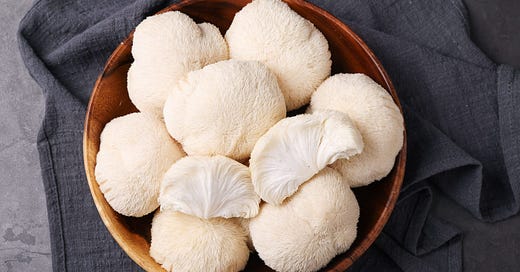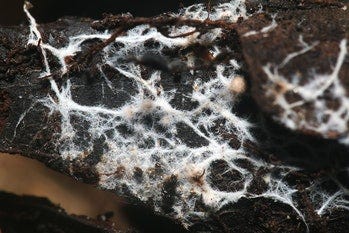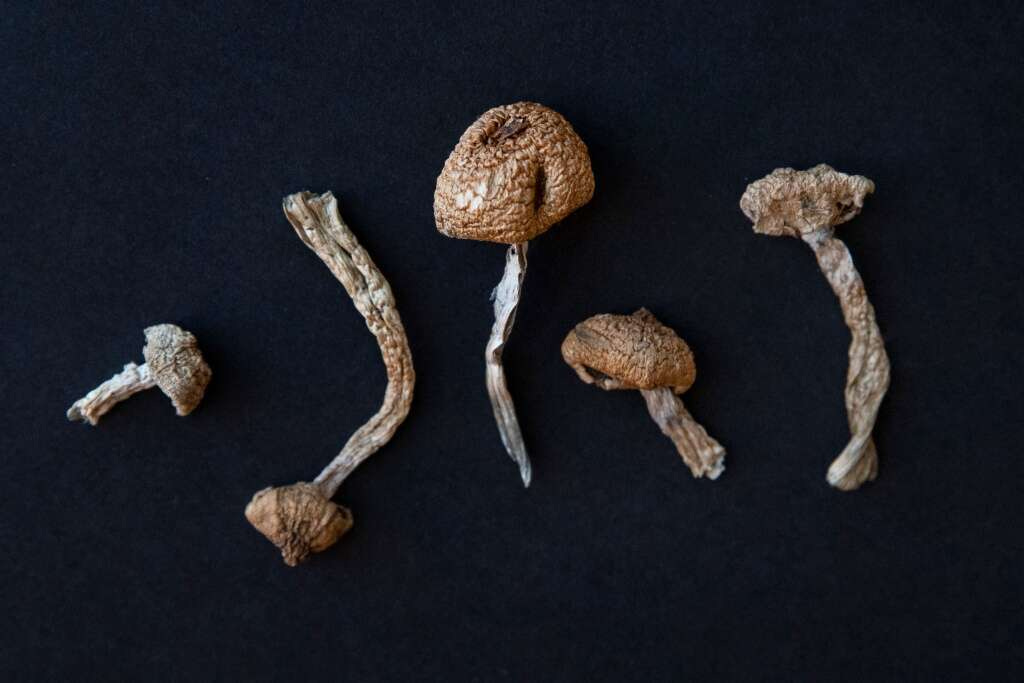Hey Fungi fam, did you miss me? Cuz I sure missed you, and after what seems like an entire month away, i’m back and as ready as ever to bring you all the exiting happenings around the world of fungi. And in some personal, fungi related news, it’s been quite a busy few weeks for the Iowa Fungi, but the planning is finally coming together and the growing season is quickly approaching! Can’t wait to keep you all updated on our progress as we get this little experiment under way! But for now… to the stories!
Lion's Mane Mushrooms Are a Great Substitute for Shellfish, but That's Not the Only Reason to Love Them
First story up this week, let’s talk about Lion’s Mane! Lion's mane is edible, delicious, and considered a functional food since it offers numerous health benefits. It’s also is yummy, and pretty good for you, too.
Viewed up-close the lion's mane resembles a shaggy ball of closely packed, dangling threads, icicles, or soft white teeth. Wild lion's mane can grow very large, up to 10 pounds, fruiting on dead trees and logs, but also on injured, living trees. Lion's mane's natural season is late summer through fall and winter. For mushroom hunters, finding one is like discovering that pot of shiny stuff at the end of the rainbow—just better-tasting. And according to experts, it’s also relatively easy to cultivate, making these fresh mushrooms increasingly available from farmers' markets and gourmet vendors.
So What Do Lion's Mane Mushrooms Taste Like, and How Should You Cook Them?
Well in terms of texture, lion's mane is tender and spongy, with some bounce. It has a reputation for being an excellent substitute for crab or lobster, making it very appealing to anyone who suffers from shellfish allergies. The mushrooms have a very mild sweetness. Lion's mane mushrooms make an outstanding chowder.
Lion’s Mane are also A Functional Mushroom
In small clinical trials involving human test subjects, lion's mane has been shown to have mild anti-depressant effects. And in lab studies, nerve-regenerative properties and antimicrobial effects have been researched with positive outcomes. In traditional and folk medicines, lion's mane has long been associated with staving off dementia, and is known as the "smart mushroom" for its association with brain health.
Whether your go-to comfort soup is hot-and-sour, or red wine-based, add some lion's mane and savor its complex goodness. Who know’s, in a year or so, the Iowa Fungi’s may even be able to supply you with some fresh ones!
Fungi Found to Shield Intestines from Injury and Shape Social Behavior in Mice
The second story on the docket this week details a new mouse study. This study has revealed that a specific group of fungi residing in the intestines may actually be able to protect against intestinal injury and influence social behavior. The findings extend a growing body of work identifying a “gut-immunity-brain axis.”
The study, “Mucosal fungi promote gut barrier function and social behavior via Type 17 immunity,” is published in the journal Cell, and revealed a novel set of molecular signals connecting fungi in the gut to their host’s cells throughout the body, including immune cells and neurons.
The key takeaway, to summarize, documents the establishment of a direct link between a major immune pathway induced by fungi, which line the intestine to send signals in the nervous system that impact behavior.
The researchers also observed that mice carrying the fungal community in their gut displayed more social behavior than animals without these fungi.
Both effects appear to stem from the animals’ own T cells. The fungi caused T cells to secrete two immune signaling proteins, cytokines IL-22 and IL-17. Fungi-induced IL-22 acts locally in the epithelium, strengthening its barrier function, while IL-17 enters the bloodstream and eventually reaches neurons, which have receptors for it.
The researchers hope to explore that communication network further. “We are trying to go deeper into the mechanisms of this interaction, looking at the signals that are involved at the neuronal level in different brain regions,” said lead author Irina Leonardi, PhD, an instructor of immunology in medicine in Iliev’s laboratory at the Jill Roberts Institute for Research in IBD.
Colorado may be the Next State to Decriminalize ‘Magic’ Mushrooms
And finally, another positive development on the regulatory front. For those unaware, back in 2019, Denver (along with a growing number of cities and states around the country) moved to decriminalize mushrooms and other psychedelic substances. Well, it seems the Denver experiment has gone over well, leading some advocates to believe it’s time to push for that same outline at the state level. They’re working on initiatives that, if approved for the November ballot, would ask voters to eliminate criminal penalties under state law for possession, use and cultivation of certain psychedelic substances.
Four initiatives have been approved by the state Title Board, and advocates are debating which one to petition onto the statewide ballot in November. Another camp of activists has put forward their own measure, which is still under review, that would decriminalize mushrooms and three other psychedelics without calling for further state regulations.
The move to decriminalize magic mushrooms in Colorado comes as Denver and jurisdictions across the U.S. have enacted laws to legalize use of psychedelic substances.
Shannon Hughes, an associate professor of social work at Colorado State University in Fort Collins, said that, outside of studies and clinical trials, underground guides have long been helping people access psychedelics to treat health issues, explore their spirituality and experiment recreationally.
“There are folks who have been doing this work for a very long time, but because it’s underground, they can’t really talk about their experience without fear of criminal risk,” Hughes said. “All we get access to is how it’s getting medicalized.”
This all piggy backs off of the growing body of research, which suggests benefits from psychedelics. Recent studies and clinical trials are showing psilocybin, LSD and other psychedelics have the potential to treat serious depression, end-of-life anxiety, post-traumatic stress disorder and other issues.
Psilocybin and other psychedelics were previously studied in the 1950s and 1960s as treatment for alcoholism and other health issues. But as recreational use and stigma surrounding the substances grew, several states banned their use, eventually culminating with the Controlled Substances Act in 1971.
Researchers at Johns Hopkins University, however, have argued for rescheduling psilocybin as a Schedule IV drug, alongside substances like prescription sleep aids, if it clears additional clinical trials. They cite studies of animals and people that suggest psilocybin has low abuse potential and there is no known overdose level, and advocate for using psilocybin in clinical settings. We’re still in the very early innings when it comes to studying these substances, but the removal from schedule 1 would be a positive first step.
Thank you for reading this weeks edition of Fungi Friday’s! If you enjoyed what you found, please feel free to forward to friends also interested in the Fungi Community!
Connect with me on Twitter @BowTiedMushroom
And if you were forwarded this post and enjoyed what you found, please subscribe below:




